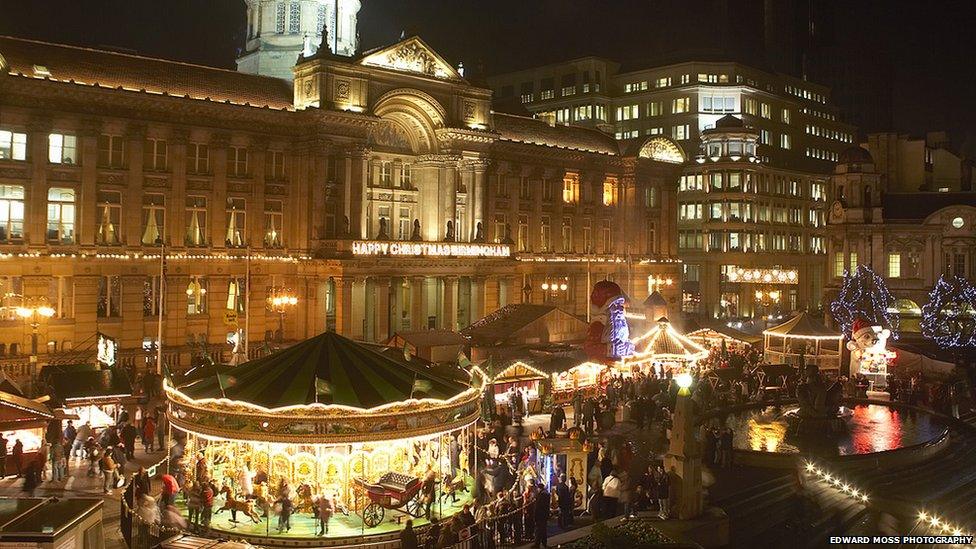Birmingham Christmas Frankfurt Market: How German is it?
- Published
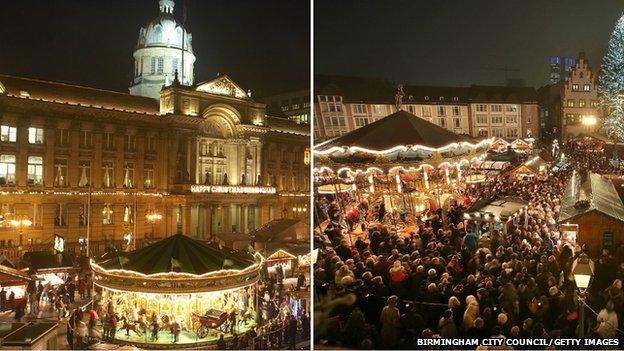
Birmingham has been running a market modelled on Frankfurt's every year since 2001
Birmingham's annual German Market has opened for its 14th successive year. With almost five million visitors in 2013 it has been described as "bigger than Berlin's", external. But how German is it?
Each winter, the smell of Glühwein and sizzling Bratwurst fills the city centre air.
Rows of wooden huts selling festive trinkets, sweets and gifts snake the route from the Bullring towards Victoria Square, where large crowds can be found tucking into pretzels, cakes and countless sausages.
The Birmingham Frankfurt Christmas Market, to use its proper title, has become, for many, the city's premier yearly tradition since it began in 1997.
Its popularity slows shopping streets to a crawl throughout its six-week residence, as locals and tourists alike browse stalls and gulp Glühwein.
Organisers claim it is the "largest authentic German market outside of Germany and Austria". It has grown from a humble 10-stall pilot project into a mile-long trail of about 200 huts.
But is it German? Not particularly, some may argue, given that many of the workers are not German and often cannot speak the language.
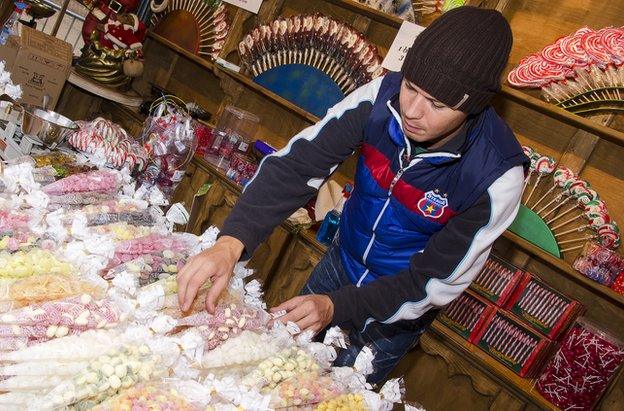
Stallholder Cristian Lus originally hails from Romania
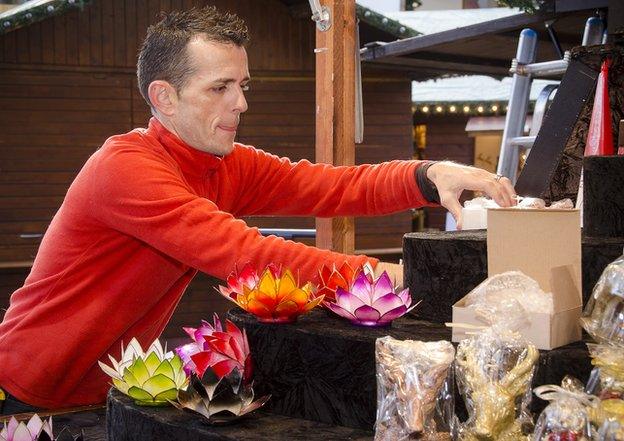
Ludovic Gaultier travels from France to work at Birmingham's market
Dr Ruth Whittle, a German national who teaches at the University of Birmingham, sends her students to the market to interview stallholders.
"They would come back and say 'there wasn't anybody there who could speak German'," she said.
The lack of native workers has detracted from the atmosphere of the market, she added.
"They don't need to be German, but it would be nice if they could speak German," she said. "You could ask them about the product or where they come from."
However, there is still a German presence in Birmingham. Astrid Raadschelders, from Cologne, has run a stall selling Frankfurt Würstchen since 2001.
She said Birmingham had become like a "second home" for her and her family. "We like coming back every year," she said.
Kurt Stroscher, from Frankfurt's tourist board, organises both cities' markets, and has been in charge of the West Midlands version since its trial run almost 20 years ago.

Birmingham's German Market
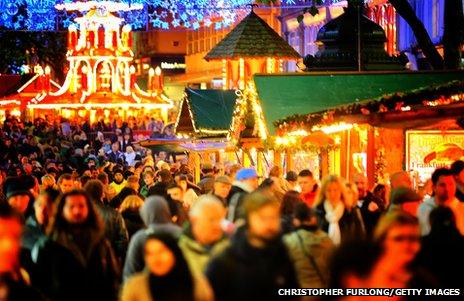
Employs about 1,000 staff, from stall workers to specialist electricians.
Covers almost 30,000 sq m, more than four full-sized football pitches.
Has about 200 stalls in 2014, including the craft market.
Home to a singing moose, which has its own Twitter, external account.

When it first came to the UK, all stalls were manned by staff from the city, but in recent years the number of non-German workers has increased.
He admitted Birmingham was now staffed by many workers from "Eastern Europe, Romania and Poland".
While the majority of stalls seem to be German-owned, most of the staff are not.
One worker, Ludovic Gaultier, from France, has been working at Birmingham's market for the past four winters selling candles and chocolates.
Another, Cristian Lus, hails from Romania but lives in Frankfurt.
He said he did not normally work on market stalls but had travelled to Birmingham with his wife, who did.
Journalist Sebastian Kisters, from Frankfurt, has visited Birmingham's market and said there was "no difference" in the items being sold,
It is a sentiment echoed by Dr Whittle.
"I know a lot of my German friends come and buy quite a lot of things from the market if they can't get to Germany that year," she said.
"The products and the brands you get there are the same ones you would get in Germany."
She said stallholders had told her stories of German ex-pats buying vast supplies of bread and other imported food it is difficult to find in the UK.
There is another important difference between the Birmingham and German markets - namely, the relative importance of drinking beer.
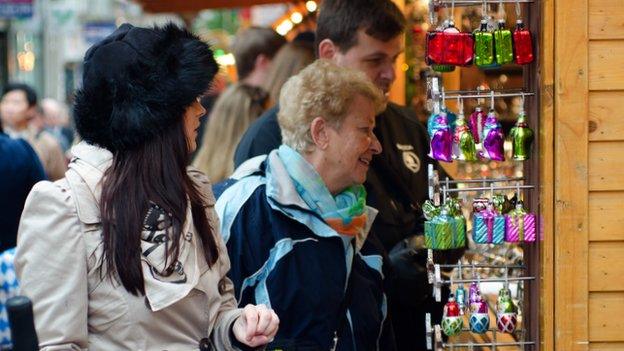
There are around 180 stalls selling handcrafted goods in Birmingham city centre
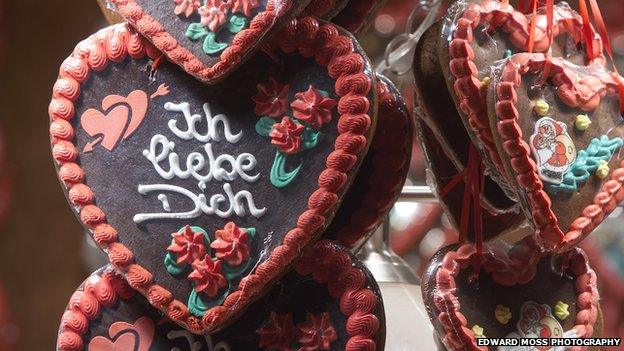
Sebastian Kisters said there was "no difference" in products on offer at Birmingham and markets in Germany
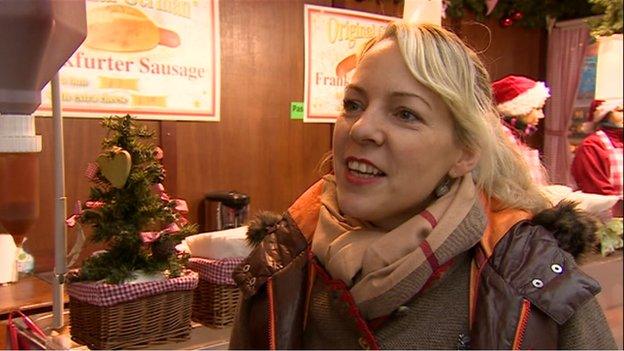
Astrid Raadschelders has been running a stall at Birmingham's market since 2001
Oliver Barnes, a fourth-year German studies student who spent a year in Munich, said he found customers in the city's market opted for Glühwein or non-alcoholic drinks.
"I would say they were quite similar, but one thing I noticed in Munich was that it tended to be more food-orientated," he said.
Mr Stroscher, who also organises markets in Manchester and Leeds, said Brits tend to be more interested in drink.
He said the Leeds version in particular, with its centrepiece of a lively beer tent, was a concession to more English tastes.
"The English tradition is more of a celebration, to have a Christmas party," he said.
"In Germany we tend to be much quieter."
Mr Stroscher said the Birmingham market, with crowds packed around a network of stalls, was more like what would be found in Germany.
Perhaps the most German aspect of the market, some said, was the mere fact of its existence.
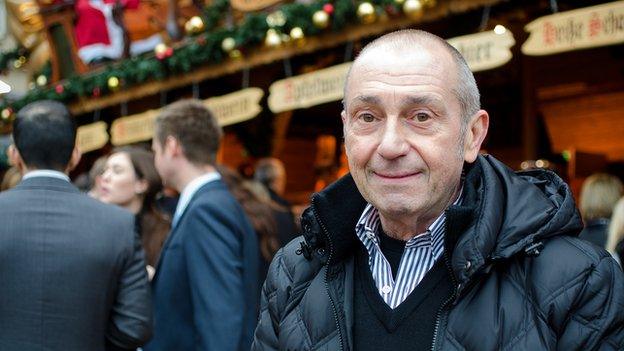
Kurt Stroscher has been organising Birmingham's Frankfurt German market since 2001
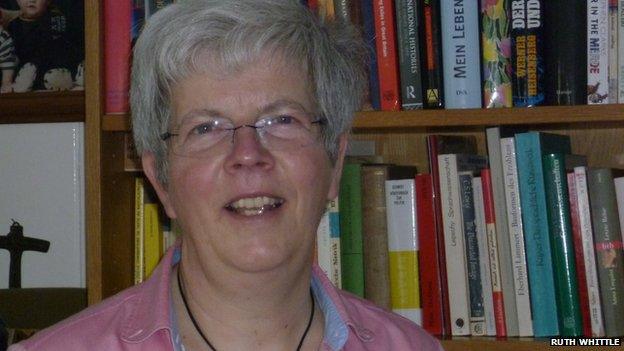
Dr Ruth Whittle said there had been an increase in non-German workers at the market
Mr Kisters said Weihnachtsmarkt, as they are known, are an integral part of the country's festive season.
Even small, remote villages will stage their own versions, he said, if only for a weekend.
"It's where people can come together, drink a Glühwein or hot orange juice and have fun," he said.
"It's a romantic side of the Germans."
Birmingham's Lord Mayor, Shafique Shah, has described the city's Christmas market as its "flagship" annual event.
And Mr Stroscher said it had become as much of a tradition for Brummies as the people of Frankfurt and other German towns.
"Nowadays the market is so great and important for Birmingham and makes it into one of the most important towns in the UK for Christmas shopping," he said.
"For me it's not possible to think about Birmingham without the market anymore."
- Published13 November 2014
